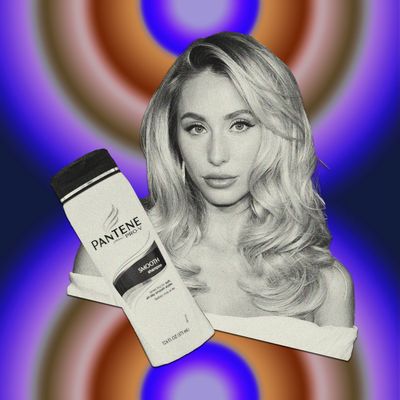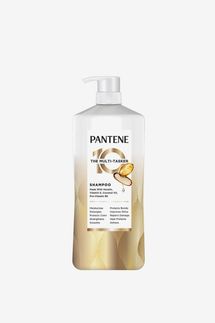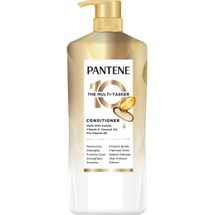
As long as I’ve been a beauty editor, there’s been a simmering debate about drugstore shampoos and conditioners among hair cognoscenti. Some experts (especially those who work in salons selling pricey products — coincidence?) say drugstore products are bad because they load strands with silicones that sacrifice long-term health for short-term softness and shine. Others (especially those who develop and market drugstore brands — coincidence?) say silicones are fine for hair and you shouldn’t judge a product by its price. Now, thanks to Alix Earle, the debate has gone mainstream.
Just before the New Year, Earle posted a video on TikTok in which she asked her 7.2 million followers: “This might be crazy of me to say, but how come when I come home and I use my expired Pantene shampoo and conditioner, my hair feels softer than it’s ever felt?” And that fired up the drugstore-versus-salon debate: Are inexpensive shampoos and conditioners fine for hair?
The debate is usually centered around the use of silicones — probably because Pantene’s products have a nice slip to them, so people assume they’re loaded with lots of silicones. But many brands sold at drugstores and salons use silicones, such as dimethicone and other silicone-based polymers, to lubricate hair, so it is easier to brush without breakage, it feels softer, it’s protected from heat damage, and it looks smoother and shinier. These ingredients typically aren’t water soluble (if they were, they would rinse out), so they achieve all these benefits by sticking to your strands. The hypothesized downside of that stickiness is that the silicones will build up over time, eventually making your hair look dull, preventing the other hydrating ingredients in shampoos and conditioners from moisturizing hair, attracting environmental pollutants that stick to hair, and even messing with the way your hair responds to color.
But the experts I talked to say that’s a gross simplification. “A product’s efficacy should not primarily be determined by whether a formulation has silicones or not; it’s about how those silicones play with the other ingredients to give your hair exactly what it needs,” says Erica Douglas, a.k.a. Sister Scientist, a cosmetic chemist with more than 20 years of experience formulating products for drugstore and luxury brands.
Are silicones bad for your hair’s long-term health?
No. “There is no harm in using hair-care products that contain silicone or siliconelike ingredients over time, unless you have a habit of not regularly cleansing your hair properly,” Douglas says. “And most shampoos, especially a clarifying shampoo, should easily remove any film or buildup left on the hair from products that contain silicones.”
That said, there are different types of silicones, and they interact with the other ingredients in shampoos and conditioners in different ways, so your personal experience with a product that happens to contain silicones and is sold at a drugstore may not always be positive and may change over time.
Hairstylist and trichologist Shab Caspara, the founder of Leona, explains it this way: If you use a product that’s not formulated well, “you might have a little period where your hair actually feels great, and then all of a sudden you’re going to wonder why your hair looks so dull and brittle, why it’s not curling as well, why the color isn’t taking at the salon. So you’re like, Oh my God, I don’t know what’s going on. If that happens with a drugstore product, but it didn’t happen with a salon product, you might conclude that the cheaper product and its silicone are to blame. In some cases that could be true, but not always. “It still depends on how the product was formulated,” Caspara says.
Does Pantene work well for most hair?
Probably, but everybody’s hair is different. “Pantene can deliver great results for one person but not deliver so well for somebody with a different hair type, texture, or desired look,” Douglas says. “Brands like Pantene invest heavily in research and development to create effective products at a price point that’s accessible. Their ability to mass-produce large volumes of product helps to lower costs, but not necessarily quality.”
Why do silicones have a bad reputation?
The most interesting part about this whole debate is that some of the same silicones demonized in drugstore products for “coating” hair are lauded in high-end products as “shields” that protect hair. It’s all about how the message is framed. “I believe this urban legend stems from the financial incentive for both stylists and luxury, high-end brands to create a narrative that makes cheaper products look inferior,” says Douglas. And calling the silicones in cheaper products a “coating” is an easy narrative for people to understand, with its implication that the hair is weighed down and struggling to be healthy under a thick, waxy coating.
Caspara, who used to work in salons and has helped to develop products, has seen this marketing game firsthand. “I’ve been on development teams where they’d be like, Okay, you guys, like, we have to cut out silicone. Why? Because marketing and social media say so. So we’re all trying to come up with silicone alternatives. Because why? Well, because we’re not doing a good job educating people.”
So, if it’s formulation — not price or the presence of a particular ingredient — that affects product quality, how do I know what’s best for my hair?
Trial and error. The particular Pantene products Earle used (she didn’t ID them, but they look like The Multitasker 10 collection) may be great for her hair, but that doesn’t mean they’re great for yours. “That’s her particular hair type, her history, her health. How often is she washing her hair — once a week, once every 10 days?” Caspara wonders. We also don’t know how long her results will last. “Talk to me about what happens when she goes to get her highlights touched up and maybe isn’t getting the same results. You just don’t know.”
Ultimately, a TikTok recommendation is a fine place to start the trial-and-error process of finding what works for you, but it’s important to realize whatever you learn about a new product you try is only specific to that particular product. “Every product isn’t for everybody! Pantene can deliver great results for one person but not deliver so well for somebody with a different hair type, texture, or desired look,” Douglas says. “Having worked behind the scenes of many of these brands, I can confidently say that an expensive price tag doesn’t always mean better, and affordable doesn’t mean ineffective.”
Send your questions to [email protected]. (By emailing, you agree to the terms here.)




